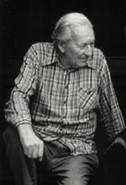However, the interrelated web of his ideas, as well as his special point of view, makes it difficult to understand fully many of his essays in isolation (and this is true all the more of isolated phrases) until the point of view and general outlines of his system of ideas are grasped. A sentence such as "the transform of a difference travelling in a circuit is the elementary idea" (1972:549) or the significance of the "double bind" theory of schizophrenia requires some fairly elaborate contextual placement.
We believe that the kind of system and the way of thinking that Bateson worked toward provide intellectual tools that are much closer to contemporary ideas of how phenomena are organized than the received assumptions that he worked to modify. His seminal power lies in the articulation of his insights and in his pointing out and illuminating the kinds of problems and paradoxes that are the residuals of worn out paradigms. The sketchy selection of issues and approaches to which we are limited in this short appreciation are necessarily inadequate, and we must refer readers back to his writings for clarification and perspective.
Bateson was interested in something beyond ethnography and the description of either "raw data" or of data related to "middle-range analytic problems" such as, say, the organization of kinship systems. Terence Turner (1980), in a review ofMind and Nature, has observed that some readers and listeners tended to dismiss Bateson's work because he tended to move from general principles of the highest order of abstraction directly to (and from) examples, which he connected by metaphor or analogy, without seeming to come to grips with middle-range analytic problems.
Gregory Bateson, 1978.
Photo: © Fred Roll

Many investigators, especially in the behavioral sciences, seem to believe that scientific advance is predominantly inductive, and should be. . . . They believe that progress is made by the study of the "raw" data, leading to new heuristic concepts. The heuristic concepts are then to be regarded as "working hypotheses" and tested against more data. Gradually, it is hoped, the heuristic concepts will be corrected and improved until at last they are worthy of a place in the list of fundamentals. About fifty years of work in which thousands of clever men have had their share have, in fact, produced a rich crop of several hundred heuristic concepts, but, alas, scarcely a single principle worthy of a place in the list of fundamentals. [1972:xix]
In Bateson's view the heuristic concepts generally employed in social science explanation are in a class with the "dormitive principle" made to account for opium's soporific qualities in Moliere'sThe Doctor In Spite of Himself.
For the sake of politeness I call these "heuristic" concepts; but in truth most of them are so loosely derived and so mutually irrelevant that they mix together to make a sort of conceptual fog which does much to delay the progress of science. [1972: xviii]
Explanation is the mapping of data onto fundamentals . . . [and] the ultimate goal of science is the increase of fundamental knowledge. . . [but] the vast majority of the concepts of contemporary [social science] . . . are totally detached from the network of scientific fundamentals. [1972:xix]
Batesonarguedthatmanyaspectsofthefundamentalstructureandprocessesrelevanttothesegmentoftheworldinvolvingcommunication,messages,andmeaninghadtobecarefullydistinguishedfromthosethatwererelevanttootheraspec


 正在提交中...
正在提交中...



